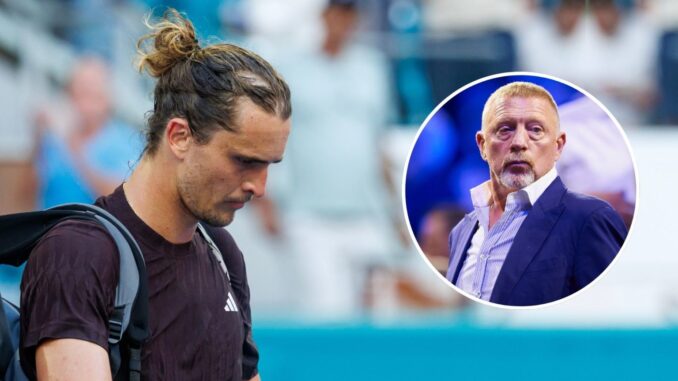
In the unforgiving crucible of professional tennis, where every season is a fresh battleground for glory, Alexander Zverev’s 2025 has begun with a thud rather than a roar. The German star, ranked No. 2 in the world, has stumbled out of the gate, his early exits piling up like fallen leaves after a promising 2024 that saw him reach two Grand Slam finals. Enter Boris Becker, the tennis legend whose six Major titles and razor-sharp insights make him a voice impossible to ignore. Becker, a compatriot and keen observer of Zverev’s career, is convinced he’s pinpointed the root of the 27-year-old’s woes—a “big problem” that’s less about forehands and backhands and more about the mind behind them. As Zverev grapples with this rocky start, Becker’s diagnosis offers a compelling lens into a champion’s struggle to turn potential into triumph.
Zverev’s 2025 kicked off with sky-high expectations. After a 2024 that included a French Open final loss to Carlos Alcaraz and a straight-sets defeat to Jannik Sinner at the Australian Open, he’d ended the year on a high, clinching the Paris Masters and reaching the ATP Finals semi-finals. Fans and pundits alike saw a player on the cusp of Grand Slam glory, his thunderous serve and relentless baseline game finally poised to break through. But the new season has been a cold splash of reality. At the Australian Open in January, he fell in the final to Sinner once more, a match Becker watched with a sinking feeling. “When he walked into the court with his shoulders slightly slumped forward and his head hanging low, I thought, ‘Oh god, oh god, oh god,’” Becker recalled, painting a vivid picture of a player already battling himself before the first ball was struck. Since then, Zverev’s form has cratered—early losses in Buenos Aires, Rio, and Acapulco to players he’d typically dispatch with ease, followed by a first-round exit at Indian Wells to Tallon Griekspoor. “I have no answers right now,” Zverev admitted after that defeat, his frustration palpable.
Becker, however, believes he does. “He is not convinced of himself,” the three-time Wimbledon champion asserted, cutting to the heart of what he sees as Zverev’s Achilles’ heel. It’s not a lack of talent—Becker insists Zverev “has the shots and the power” to conquer any Major. Nor is it purely physical, though a biceps strain from the United Cup in December briefly sidelined him. No, Becker’s diagnosis is mental, a deep-seated doubt that gnaws at Zverev’s psyche when the stakes are highest. “If you’re not convinced deep down that you’re good enough, you won’t win,” he explained, contrasting Zverev’s mindset with Sinner’s, whom he described as “pure sunshine” on court—brimming with belief. For Becker, this mental gap was the “big difference” in Melbourne, where Sinner’s confidence carried him to victory while Zverev seemed “not mentally on the court.”
This isn’t the first time Becker has sounded the alarm. Back in 2023, he warned that Zverev’s window to claim a Grand Slam was narrowing as younger stars like Sinner and Alcaraz surged ahead. Now, at 27, Zverev is at a crossroads—old enough to have a decade of tour experience, young enough to still chase greatness, but running out of time to silence the doubters. “He has to do it in the next 18 months,” Becker urged, suggesting that if Zverev doesn’t crack the Major code by 2027, the path will grow steeper as the next generation tightens its grip. The pressure isn’t just about titles—it’s about legacy. As Germany’s best hope since Becker himself, Zverev carries the weight of a nation’s tennis dreams, a burden that might be amplifying his inner turmoil.
Zverev’s camp isn’t blind to the struggle. After splitting with Sergi Bruguera last year, he’s returned to the familiar guidance of his father, Alexander Sr., and brother Mischa, a setup that’s yielded 23 career titles but no Grand Slam silverware. Whispers of a potential coaching shake-up with Becker himself have swirled—Zverev has praised the legend’s “incredible knowledge of tennis”—though logistical hurdles, like Becker’s travel limitations post-2022 legal troubles, remain a sticking point. For now, Zverev’s team is tasked with reigniting the spark that saw him dominate indoor hard courts late last year. “I need to find my game,” he said after Indian Wells, a candid admission that echoes Becker’s call for mental clarity.
As the clay season approaches, starting with Monte Carlo, Zverev has a chance to reset. His past success on the surface—two Rome titles and that near-miss at Roland Garros—offers hope. But Becker’s words linger like a challenge: belief must precede victory. Will Zverev heed the warning, shed the doubt, and finally claim the prize that’s eluded him? Or will 2025 become another chapter of what-ifs for a talent Becker insists is “good enough”? The tennis world watches, waiting for the answer to unfold on the courts where champions are made—or broken.
Leave a Reply